17
January 2002
![]()
2. "The Other Summit", columnist Sami Kohen writes on two summits held in two capitals thousands of miles apart from each other.
3. "Turkish Leader Visits Bush, Rumsfeld", in a meeting with Turkey's leaders, Defense Secretary Donald Rumsfeld on Wednesday said the United States supports Turkey's proposal to take over the leadership of the peacekeeping force in Afghanistan, Turkish officials said.
4. "Turkey's Iraq troubles", as the war on terrorism draws to a close in Afghanistan, talk is growing in Washington about a "next phase" that would include Iraq.
5. "Turkish leader urges rapid adoption of refoms to secure EU bid", Turkey's Deputy Prime Minister Mesut Yilmaz on Wednesday warned that Ankara's decade-old bid to join the European Union will be derailed if it fails to meet short-term targets towards accession by the end of March, as promised.
7. "Central Asia/Russia", Turkey banking on Saddam (by Nadire Mater)
8. "The 'deep' meaning of the trip to US", the "primary forces" in Turkey who believe that the European Union's demands would cause Turkey to be split up, express certain pro-EU views but, in effect, they conduct an implicitly anti-EU policy.
1. - Turkish Daily News - "Mistakes by PKK":
By Ilnur Cevik
PKK continues its provocations while it hardly cares for the people
of southeastern Turkey who can't even buy a slice of bread...
The Kurdistan Workers' Party (PKK) terrorist organization is continuing on its course of confrontation with Turkey and is only creating the conditions for its own destruction.
The PKK is behind a rather awkward campaign by a some university students who have presented petitions to their university administrations demanding that they be educated in Kurdish...
Now the PKK is using primary school children in Istanbul for a continuation of this absurd campaign. They have made nearly three dozen mothers of the students present petitions to primary school administrations demanding that their children be educated in Kurdish...
Soon, we are told, the PKK will also encourage a campaign for a group of citizens of Kurdish origin to apply to the birth certificate offices across the country demanding that their Kurdish identity be documented.
All these developments suggest that the PKK is still after creating public disorder, chaos and discord in the country. They are still fanning separatism.
We would have thought they would have drawn the necessary lessons of the very unfortunate incidents of the past and thus would not have repeated these mistakes of sowing the seeds of discord. All the PKK has done is bring more hardships and suffering on the people of southeastern Turkey.
We support the idea that some people in Turkey, including some of our citizens of Kurdish origin, are not being treated as first class citizens of the Turkish Republic. We have been saying this for nearly two decades and we will continue saying this in the future as long as things do not improve.
Yet, we only see provocation and evil in what the PKK is doing. The citizens of Kurdish origin should be allowed to speak their native language. They should be allowed to communicate and use the media in this language.
But the official language of this country is Turkish and this language should be used as the means of communication of the people of our country. Yes, we could have some optional courses in Kurdish is come schools in southeastern Turkey and in some universities but that would only be subject to the supply and demand situation and not a set rule.
It is absurd to say people will go to primary schools or even universities where the education language is exclusively Kurdish. The PKK, or anyone who claims to be really caring for the people of Kurdish origin, should be more concerned with the plight of the people of southeastern Turkey these days instead of such meaningless issues. The economic crisis had created deep suffering in the region. People are desperate. No one cares for language or even cultural rights when they can't even afford buying a slice of bread.
But the PKK and its crowd have no concern for the people.
They have not even put in half of the constructive struggle we have
put into improving the conditions of the people of southeastern Turkey
over the years. They only know how to kill, ruin and destroy. They do
not know how to build and create.![]()
2. - Milliyet - "The Other Summit":
Columnist Sami Kohen writes on two summits held in
two capitals thousands of miles apart from each other. A summary of
his column is as follows: 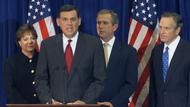
Today, in two capitals thousands of miles apart from each other,
two important summits are being held which are of great importance to
Turkey. The first summit will be between Prime Minister Ecevit and US
President Bush. The second will be held by Greek and Turkish Cypriot
leaders Clerides and Denktas in Lefkosha. It is an interesting coincidence
that both summits take place on the same day.
Cyprus is not one of the top priority issues on the agenda of Ecevit's US talks. Most probably, President Bush will bring up the Cyprus issue during their talks, expressing his pleasure over the resumption of bilateral negotiations and calling on Turkey to help in the search for a solution. If an accord had not been reached to resume face-to-face talks during the Denktas-Clerides meeting on Dec. 4, the meeting in Washington might not have taken place in such a positive atmosphere. Will this negotiation process lead to a concrete result? It is very hard to guess at this point. However, it can be said that they have the chance to proceed on and even succeed.
Both leaders know that this is their last chance and if they are not successful, unpleasant incidents may occur. Both sides are aware that 'intransigence is not a good solution.' But this is not enough. Both sides also have to exert great efforts for a serious agreement without trampling on their basic interests. It is hard but not impossible. Both sides have to take care not to destroy the air of optimism or lose the momentum gained. There are two ways to ensure this.
The first is to declare a 'speech moratorium' and act
accordingly. The second is to take steps towards building confidence
rather than shaking it. Non-governmental organizations may help in this
point, as in the rapprochement between Turkey and Greece. At the moment
it is foreseen that three meetings per week will be held in Lefkosha.
The leaders had agreed before that they would not leave the negotiation
table until they come to an accord. We hope that this will be so. ![]()
3. - AP - "Turkish Leader Visits Bush, Rumsfeld":
WASHINGTON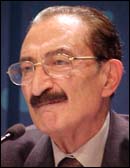
In a meeting with Turkey's leaders, Defense Secretary Donald Rumsfeld
on Wednesday said the United States supports Turkey's proposal to take
over the leadership of the peacekeeping force in Afghanistan, Turkish
officials said.
Rumsfeld underlined Turkey's key role as a strategic ally, both in the war against terrorism, but also within NATO, the officials said, speaking on condition of anonymity.
Prime Minister Bulent Ecevit, who was scheduled to meet President Bush later Wednesday, told Rumsfeld that Turkey was committed to the long-term reconstruction of Afghanistan and has proposed helping with the establishment of a modern Afghan army.
Ecevit says the creation of a unified national army is essential to end to decades of factional fighting in Afghanistan. Turkey is sending 261 military personnel for the peacekeeping force, currently under British leadership.
Turkish officials quoted Rumsfeld as saying that the United States would be pleased if Turkey were to step in as leader of the peacekeeping force.
Turkey's government is secular, but its Muslim society and people make its support that much more important for the United States as the Bush administration works to overcome anti-Western sentiment among the world's Muslims, particularly Arabs.
Turkish officials said Rumsfeld praised Turkey as a model for Afghanistan and other Muslim countries. Turkish support also would be crucial to any fight against Iraq, its neighbor to the south, considered a possible eventual target as the administration widens its counterterrorism efforts beyond Afghanistan. Turkey was a launching pad for attacks against Baghdad during the Gulf War, and it still is host to U.S. and British warplanes enforcing a flight-interdiction zone above northern Iraq.
Turkish officials said Ecevit and Rumsfeld did not discuss Iraq. Turkey has strongly opposed any attempt to overthrow Iraqi leader Saddam Hussein, although it appears prepared to somewhat soften that position, arguing that what is important is Iraq's territorial integrity and not the regime in Baghdad.
Turkey believes Iraqi territorial integrity is essential and worries particularly about a predominantly Kurdish area of northern Iraq. Turkish officials fear that a U.S. military strike could lead northern Kurds to take advantage of a subsequent power vacuum to try to create a Kurdish state, which could in turn boost the aspirations of autonomy-seeking Kurds in Turkey.
In an apparent attempt to address Turkish concerns, two Iraqi Kurdish groups controlling a Kurdish zone in northern Iraq said Wednesday they remained committed to Iraq's territorial integrity.
Ecevit also meets Treasury Secretary Paul O'Neill Wednesday.
In a meeting with Vice President Dick Cheney Tuesday, Ecevit thanked Cheney for the U.S. support for the IMF loans. The $19 billion was to help Turkey out of a serious financial crisis and is expected to be followed this year by another $10 billion loan.
Turkey also wants help with $5 billion worth of military debts it has with the United States.
Rumsfeld did not comment on the Turkish request during
the meeting Wednesday, but said the United States was looking into what
could be done to address Turkey's economic and trade requests. ![]()
4. - The Christian Science Monitor - "Turkey's Iraq troubles":
WASHINGTON / by Bora Yagiz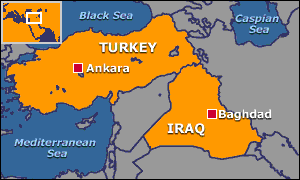
As the war on terrorism draws to a close in Afghanistan, talk is
growing in Washington about a "next phase" that would include
Iraq. As a traditionally close ally of the United States and a NATO
member with a predominantly Muslim population, Turkey is in a delicate
position. It is clear that Turkey's support is crucial for any US military
strike against Iraq. But are the Turks as willing to cooperate as the
late President Turgut Ozal was in 1990?
The possibility of such a military operation brings back bitter memories of the Gulf War of the early '90s, when Turkey's prospering economy was severely hit by the war. Ironically, the ongoing economic crisis could lead to a reversal of Turkey's position on Iraq.
After Sept. 11, Turkey was reluctant to back the US in case the war spread into Turkey's southern neighbor, Iraq. In a CNN interview Oct. 16, Prime Minister Bulent Ecevit said that an attack on Iraq "could lead to the partitioning of Iraq, which ... could create problems for Turkey, for Turkey's independence or territorial integrity." He added, "We don't see any reason for attacking Iraq at all."
His concerns about the possible emergence of a Kurdish entity in the aftermath of such an operation were echoed by the military's General Chief of Staff, Huseyin Kivrikoglu. During a visit to Diyarbakir, a town near the Iraqi border, he said on Nov. 9 that Turkey did not want military action against Iraq. Turkey's apprehension is understandable: For 15 years, the country waged a costly campaign against Kurdish insurgents, ultimately defeating them in 1998. Turkey has also suffered more than $30 billion in losses from the continuing embargo against Iraq since the Gulf War, first and foremost because the Iraq-Turkey oil pipeline was shut down. In addition, trading relationships were ruptured not only with Iraq but also with other Arab nations south of Turkey.
Now all this appears to be changing. By Nov. 21, only a fortnight after an Ecevit interview on CBS-TV where he made it clear "Turkey would not support" US action against Iraq, the Turkish ambassador to the US, Faruk Logoglu, said, "new conditions would bring new evaluations to our agenda," adding that "we can make its reevaluation if a credible case is brought against Iraq, showing that Iraq is involved in the terrorist attacks."
This statement was backed by Defense Minister Sabahattin Cakmakoglu a few days later. In fact, this swift shift in view indicates that Turkey must be running out of maneuvering space and that it can no longer expect to have its cake and eat it, too. Now aware that a strike against Iraq is becoming more likely, the Turkish government has apparently realized that support of the US could be the only viable way to advance its aspirations for better relations with the European Union. Cyprus's probable accession into the EU in 2004 and the EU's intention to exclude Turkey from the European Security and Defense Policy have aggravated EU-Turkey relations.
Support of US policies on Iraq was also seen as a means to continue getting loans from the IMF and the World Bank, support that is vital to the Turkish economy. It is perhaps no coincidence that the Iraqi ambassador to Turkey was sent home Nov. 22, the day after Ambassador Logoglu's statement.
How far Turkey will go in supporting a US military strike against Iraq is unclear. Remember that the late President Ozal, who in the Gulf War didn't hesitate to turn off the valves of the Iraqi-Turkish oil pipeline and allowed free use of the strategic Incirlik Air Base in southern Turkey, could not convince the Turkish military to deploy troops against Iraq.
Today, the political climate in Turkey is even less favorable for such unconditional support. Mr. Ecevit is known for his status-quo views that would exclude intervention in Iraq. At the end of the day, however, economics may dictate politics. The Turkish economy will increasingly depend on IMF and World Bank funds over the next three years. This will probably give the US significant leverage while Ecevit is in Washington this week to discuss Iraq, among other strategically significant issues for US-Turkish relations.
By the time the prime minister is back in Turkey, we may have seen yet another step in the reversal of Turkey's position on Iraq.
Bora Yagiz is a research assistant for the Turkey Project
at the Center for Strategic and International Studies. ![]()
5. - AFP - "Turkish leader urges rapid adoption of refoms to secure EU bid":
ANKARA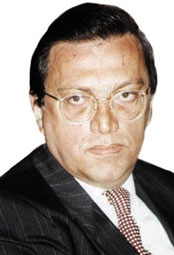
Turkey's Deputy Prime Minister Mesut Yilmaz on Wednesday warned
that Ankara's decade-old bid to join the European Union will be derailed
if it fails to meet short-term targets towards accession by the end
of March, as promised.
In a speech to MPs, Yilmaz said that Turkey had adopted in March last year a programme of reforms to catch up with European norms and to become a member of the European Union.
"We pledged to fulfill the short-term criteria listed in this programme in one year," Yilmaz said, according to the Anatolia news agency. "If we fail to do that by the end of March, not only will all we have achieved so far go down the drain, but our efforts to integrate with the West will also be jeopardized," he added. Such a situation would result in political, conomic and democratic losses for Turkey, Yilmaz said.
He said it was now time for the parliament to concentrate
on the short-term criteria, "most of which had already been fulfilled,
including a comprehensive constitutional amendment package". "If
we adopt all the short-term refoms by the end of March, we could have
the opportunity of being in the Union's second enlargement wave at least,
along with Romania and Bulgaria," he added. Turkey was accepted
as a candidate for EU enlargement talks at the Helsinki summit in December
1999, but was told it had to carry out comprehensive human rights and
democracy refoms before it can begin accession talks. It is lagging
behind the other 12 candidates, all of whom have already started accession
talks. ![]()
6. -AFP - "Iraq reports fresh Turkish incursion in Kurdish north":
BAGHDAD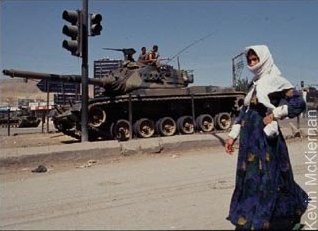
Iraq accused Turkey on Wednesday of carrying out a fresh incursion
into the north of the country and called on Ankara to pull its troops
out of Iraqi territory. "This new Turkish aggression against northern
Iraq is part of a series of flagrant violations of Iraq's sovereignty
by Turkish armed forces," said Foreign Minister Naji Sabri in a
message to UN Secretary General Kofi Annan.
"Turkey must immediately cease its acts of aggression and withdraw its troops from Iraqi territory," said the message, quoted by the official INA news agency. Sabri urged the UN chief to intervene to bring an end to Turkey's "military aggression and meddling in Iraq's affairs," INA said. The Turkish army frequently launches operations into neighboring Iraq against separatist rebels of the Kurdistan Workers' Party (PKK), who are believed to have taken shelter there since the 1991 Gulf War. Western-protected northern Iraq, which has been outside Baghdad's control since the Gulf War, is controlled by two main Kurdish factions.
The Kurdistan Democratic Party (KDP) of Massud Barzani controls an area along the Turkish border, while Jalal Talabani's Patriotic Union of Kurdistan (PUK) administers areas close to the Iranian border. The KDP and PUK, in a joint statement, said Wednesday they would not push for an independent Kurdish state in the region if the United States struck Baghdad as part of its "war on terror."
"We are advocating the territorial integrity and
unity of Iraq with a democratic and a federal solution to the Kurdish
question," they said, referring to Turkish opposition to Kurdish
independence. ![]()
7. - The Asia Times - "Turkey banking on Saddam"
ISTANBUL / by Nadire Mater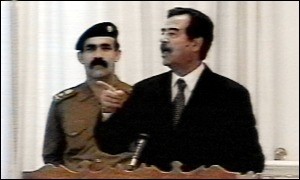
Stinging issues will be on their agenda when Turkish Prime Minister
Bulent Ecevit meets US President George W Bush on Wednesday at the White
House. From concerns over a US operation against Saddam Hussein to reduction
of tariffs on Turkish exports, the outcome of these talks will have
a long-term effect on regional balances, political analysts believe.
Turkish leaders are particularly worried by the prospect of Washington turning on Iraq after Afghanistan. The Pentagon's leading hawk, Deputy Defense Secretary Paul Wolfowitz, hinted on Tuesday last week that an attack on Iraq is not on the immediate US agenda. But Turkish political and military leaders remain uneasy about US intentions.
"US ambitions to topple Saddam Hussein regime might not result in an imminent attack, yet in unofficial talks US envoys are still asking my advice on pros and cons of a military strike against Iraq," former Turkish chief of staff Doan Gures said during a TV talk-show last Thursday night. Then in an interview with Turkish news channel NTV this week, Ecevit said that he will express Ankara's worries to Bush that any US operation against Saddam could encourage uprisings in the mostly Kurdish northern areas of Iraq bordering Turkey.
Bush will be hosting the leader of a NATO country who in the past has not hidden his sympathies for Saddam Hussein. Ecevit visited the Iraqi leader twice in Baghdad as a journalist in 1990-91. At that time, then Turkish president Turgut Ozal was offering the senior George Bush full Turkish support for an invasion of Iraq. Ecevit's opponents later dubbed him a "Saddamist". However, Ecevit's views changed after he rose to power in the late 1990s, says political analyst Hasan Cemal of Milliyet. "The military briefings during his days as prime minister, and the obligations of pursuing an alliance with the US and NATO reshaped Ecevit's thoughts."
Ecevit is prompted today by concerns over the Kurdish question, rather than sympathy for Saddam. Divided into four parts after the collapse of the Ottoman Empire, most of 12 million Kurds now live in southeastern Turkey, with some 2 million in Northern Iraq, about a million in Iran and less than a million in Syria. Kurdish guerrillas have launched an insurgency in southern Turkey and northern Iraq for the creation of a Kurd state. The Turkish government fears that Iraq may not be able to hold its present territory if the Saddam regime were to collapse under US strikes.
Kurdish political analyst Umit Firat told IPS, "Turkey indeed fears from replacement of the Saddam Hussein rule by a democratic regime which would grant broader freedom to Northern Iraqi Kurds, which in turn might present a legitimate model for Turkey's Kurds."
The Kurdistan Workers Party (PKK) declared war on Turkey in 1984 in pursuit of self-determination. Fifteen years of armed conflict have left 30,000 dead, and a devastated countryside. The PKK has built rear bases in northern Iraq and recruited guerrillas among Iraqi Kurds. It is a situation of concern to the US as well. "Washington would certainly listen to Turkey's advice before laying down concrete decisions on the issue," says political analyst Sami Kohen.
Another sour foreign policy issue to be discussed during the meeting is the 28-year-old Cyprus question, which remains a major roadblock in Turkey's relations with the West. This Mediterranean island to the south of Turkey remains divided into a Turkish north and a Greek south. The division came after the Turkish invasion of 1974 in response to a military coup by Nikos Sampson against then Cyprus president Archbishop Makarios II. Makarios II had until then led a bi-communal government.
The Turkish government maintains about 40,000 troops in the north of Cyprus on the grounds of providing security to Turkish Cypriots. UN-sponsored negotiations for a solution have been unsuccessful. The UN recognizes the Cyprus Republic as the sole legal representative of all inhabitants of the island while the Ankara-backed Turkish Republic of Northern Cyprus is not recognized by any country but Turkey.
The issue has assumed urgency since last year after the European Union decided to start negotiations for full membership of the Cyprus Republic notwithstanding the Turkish position. Ecevit is expected to seek US support for Ankara's position that Cyprus' accession to EU membership be suspended until Ankara's demands for a bi-communal government in the island are met. Bush will have heard the Greek side of the argument before his meeting with Ecevit. Greek Prime Minister Kostas Simitis began an official visit to Washington January 10.
Ecevit and Bush will also discuss the dire straits the
Turkish economy is in after the financial crisis that shook the Turkish
banking system in February 2000. Shockwaves from that saw the Turkish
economy shrink 40 percent last year. Looking to resume economic growth
by 2003, Ecevit will be looking for reduction of US tariffs on Turkish
exports, particularly textile products. Some 100 business leaders who
will accompany Ecevit will also be looking for increased cooperation
with US firms. ![]()
8. - Yeni Safak - "The 'deep' meaning of the trip to US":
By Ali Bayramoglu
The "primary forces" in Turkey who believe that the European Union's demands would cause Turkey to be split up, express certain pro-EU views but, in effect, they conduct an implicitly anti-EU policy. All their recent plans seem to be made on that "deep down meaning."
They keep a distance from the EU and try to get closer to the United States with political and economic expectations. Hence the organized attacks -- extending from the state to the media -- directed at a number of European organisations, especially at German think tanks, and the accusations about the "missionaries' activities."
This is a dangerous game.
Ecevit's trip is important when seen from this angle, that is, with regard to the direction these balances, these quests, will take.
The Sept. 11 is plunging Turkey into a mortal game with
its "deep state," that is, shadow state, its people and its
politics. ![]()